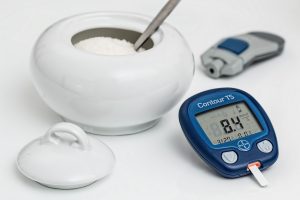 New clients at Habitat Health and Fitness in Lakeland, FL, ask me about sugar substitutes and artificial sweeteners. It’s normally in response to the initial cravings of giving up sugar. Choosing to opt for an artificial sweetener may mean you’re loading up your body with chemicals and that can be as bad or worse as using regular cane or beet sugar. In my estimation, giving up food with added sugar is one of the biggest obstacles in living healthier. Once you change your eating habits, you won’t find adding sugar necessary and be able to taste the sweetness of fresh fruit and vegetables.
New clients at Habitat Health and Fitness in Lakeland, FL, ask me about sugar substitutes and artificial sweeteners. It’s normally in response to the initial cravings of giving up sugar. Choosing to opt for an artificial sweetener may mean you’re loading up your body with chemicals and that can be as bad or worse as using regular cane or beet sugar. In my estimation, giving up food with added sugar is one of the biggest obstacles in living healthier. Once you change your eating habits, you won’t find adding sugar necessary and be able to taste the sweetness of fresh fruit and vegetables.
There are a number of artificial sweeteners according to the FDA.
The most common types of artificial sweeteners are acesulfame potassium, neotame, saccharin, aspartame and sucralose as the five types of artificial sweeteners. Each of these has a difference chemical formula and react with the body and brain differently. Artificial sweeteners change how the brain and taste buds perceive sweetness. In fact, many are far sweeter than sugar and create an overstimulation of the sweetness receptors in the brain. They can change how the brain perceives natural sugars and how low sugar foods like meat and vegetables taste. Those changes can make it difficult to stick with a healthy diet.
Are artificial sweeteners good for weight loss?
Because of their super sweetness, artificial sweeteners give you the sugar flavor with fewer calories than sugar. While you might think that cutting out the calories in sugar will automatically help you lose weight, that’s not necessarily true for all artificial sweeteners. There are studies that say artificial sweeteners increase your appetite and those that suggest some really do cut your appetite. The problem may not be the artificial sweetener, but that people feel they’re saving calories, so they indulge in other foods that contain more calories.
Diabetics may benefit from using artificial sweeteners.
Diabetics need to avoid foods that cause a rise in blood glucose levels, so artificial sweeteners may be a good option. However, as with all studies, there are always contradictory findings. Another study showed that people who drank soft drinks with artificial sweeteners increased their risk of developing diabetes significantly. Heritage may play a role in your body’s reaction to artificial sweeteners. A study of Hispanic women showed their blood sugar level rose 14% and insulin levels rose 20%. if they drank an artificially sweetened soft drink before they drank a soft drink with sugar.
- Recent studies in seniors showed that those who drank the most artificially sweetened soft drinks had the biggest abdominal circumference measurement. Another study showed they increased the risk of diabetes by 67%.
- Studies showed that people who drank more than 24-ounces of artificially sweetened soft drink had a 23% increased risk of stroke compared to those who drank 12-ounces or less.
- Using artificial sweeteners can change the gut microbiome, which affects all parts of the body, including the brain. Some sweeteners have a negative impact on digestion and can cause gas and diarrhea.
- If you have diabetes or a metabolic disease, always check with your health care professional before changing your diet. For most people, giving up food with added sugar can be tough at first, but then the true sweetness of fruit becomes more apparent and added sugar isn’t necessary.
For more information, contact us today at Habitat Health & Fitness
